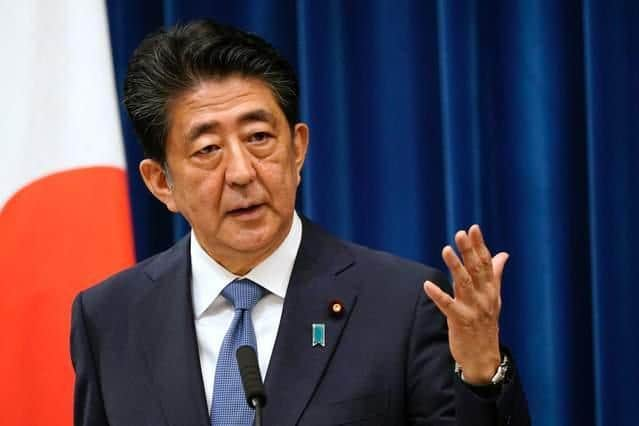Shinzo Abe: Former Japanese Prime Minister assassinated during speech, confirmed dead aged 67
A suspect in his 40s has been arrested.
Mr Abe was shot from behind minutes after he started his speech on Friday in Nara in western Japan.
He was airlifted to a hospital for emergency treatment but was not breathing and his heart had stopped.


The 67-year-old was pronounced dead later at the hospital.
-----------------
Advertisement
Hide AdAdvertisement
Hide AdMr Abe was Japan's longest-serving leader before stepping down for health reasons in 2020.
Police arrested the suspected gunman at the scene of the attack, which shocked people in a country known as one of the world's safest.
Boris Johnson said: "Incredibly sad news about Shinzo Abe.
His global leadership through unchartered times will be remembered by many. My thoughts are with his family, friends and the Japanese people.
The UK stands with you at this dark and sad time.
Former Prime Minister Theresa May said: "Mrs May, who won the backing of Shinzo Abe for her Brexit deal after talks in the UK in January 2019, tweeted: "Truly heartbreaking to hear of the death of my friend Shinzo Abe, former prime minister of Japan - killed in the most appalling of circumstances while campaigning for his political party."
Advertisement
Hide AdAdvertisement
Hide AdComparisons have already been drawn between the shooting and the murder of Jo Cox, MP for Batley in Spen, in 2016.
Former Wakefield MP Mary Creagh tweeted: "Absolutely dreadful news from Japan. Brings back terrible memories of the day we lost our much missed Jo Cox."
The Jo Cox Foundation said: "We are shocked and saddened by the murder of Shinzo Abe. Our thoughts go out to his family, friends, colleagues, and to the people of Japan. Attacks on political figures are an attack on democracy."
Public broadcaster NHK aired a dramatic video of Mr Abe giving a speech outside a train station in Nara.
Advertisement
Hide AdAdvertisement
Hide AdIn it, he is standing, dressed in a navy blue suit, raising his fist, when two gunshots are heard.
The video then shows Mr Abe collapsed on the street, with security guards running toward him.
He holds his chest, his shirt smeared with blood.
A moment later, security guards leap on top of a man in a grey shirt who lies face down on the pavement.
A double-barrelled device that appears to be a handmade gun is seen on the ground.
Advertisement
Hide AdAdvertisement
Hide AdNara prefectural police confirmed the arrest of Tetsuya Yamagami, 41, on suspicion of attempted murder.
NHK reported that the suspect served in the Maritime Self-Defence Force for three years in the 2000s.
Other videos from the scene showed campaign officials surrounding Mr Abe.
The former leader was still highly influential in the governing Liberal Democratic Party and headed its largest faction, Seiwakai.
Advertisement
Hide AdAdvertisement
Hide AdElections for Japan's upper house, the less powerful chamber of its parliament, are on Sunday.
"I use the harshest words to condemn (the act)," Mr Kishida said as he struggled to control his emotions.
He said the government planned to review the security situation, but added that Mr Abe had the highest protection.
When he resigned as prime minister, Mr Abe said he had a recurrence of the ulcerative colitis he had had since he was a teenager.
Advertisement
Hide AdAdvertisement
Hide AdHe told reporters at the time it was "gut wrenching" to leave many of his goals unfinished.
He spoke of his failure to resolve the issue of Japanese abducted years ago by North Korea, a territorial dispute with Russia and a revision of Japan's war-renouncing constitution.
That last goal was a big reason he was such a divisive figure.
His ultra-nationalism riled the Koreas and China, and his push to create what he saw as a more normal defence posture angered many Japanese.
Advertisement
Hide AdAdvertisement
Hide AdMr Abe failed to achieve his cherished goal of formally rewriting the US-drafted pacifist constitution because of poor public support.
Loyalists said his legacy was a stronger US-Japan relationship that was meant to bolster Japan's defence capability.
But Mr Abe made enemies by forcing his defence goals and other contentious issues through parliament, despite strong public opposition.
Mr Abe was a political blue blood groomed to follow in the footsteps of his grandfather, former prime minister Nobusuke Kishi.
Advertisement
Hide AdAdvertisement
Hide AdHis political rhetoric often focused on making Japan a "normal" and "beautiful" nation with a stronger military and bigger role in international affairs.
Mr Abe said he was proud of working while leader for a stronger Japan-US security alliance and shepherding the first visit by a serving US president to the atomic-bombed city of Hiroshima.
He also helped Tokyo gain the right to host the 2020 Olympics by pledging that a disaster at the Fukushima nuclear plant was "under control" when it was not.
Mr Abe became Japan's youngest prime minister in 2006, at age 52, but his overly nationalistic first stint abruptly ended a year later, also because of his health.
Advertisement
Hide AdAdvertisement
Hide AdThe end of Mr Abe's scandal-laden first stint as prime minister was the beginning of six years of annual leadership change, remembered as an era of "revolving door" politics that lacked stability and long-term policies.
When he returned to office in 2012, Mr Abe vowed to revitalise the nation and get its economy out of its deflationary doldrums with his "Abenomics" formula, which combined fiscal stimulus, monetary easing and structural reforms.
He won six national elections and built a rock-solid grip on power, bolstering Japan's defence role and capability and its security alliance with the US.
He also stepped up patriotic education at schools and raised Japan's international profile.
